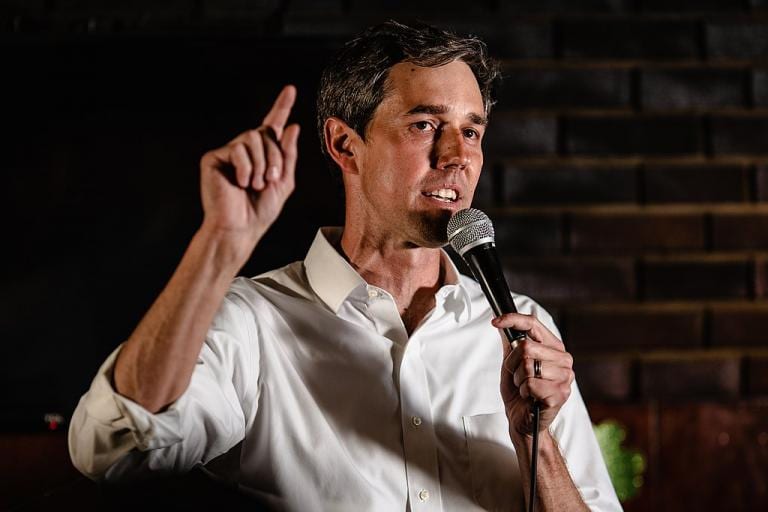What conservatives labeled as alarmists say what might happen, Beto O’Rourke actually advocates. The government will take your guns, warns the alarmist. H_ll, yes, I’ll take your guns, says Beto. The government will punish churches that don’t go along with same-sex marriage, warns the alarmist. Churches that oppose same-sex marriage should lose their tax exemption, says Beto.
And though the Texan running for the Democratic presidential nomination is unlikely to get it, his idea is getting traction with other progressives who may well end up in power.
CNN’s Don Lemmon framed the question in terms of belief: “Do you think religious institutions like colleges, churches, charities – should they lose their tax exempt status if they oppose same-sex marriage?”
“Yes,” O’Rourke said without hesitation, drawing applause from the Los Angeles audience.
“There can be no reward, no benefit, no tax break for anyone, or any institution, any organization in America that denies the full human rights and the full civil rights of every single one of us,” he added. “So as president we’re going to make that a priority and we are going to stop those who are infringing on the rights of our fellow Americans.”
As phrased here, it isn’t just that churches would be taxed if they refuse to perform same-sex weddings. The very opposition to same-sex marriage would trigger punitive taxes. So the state would be regulating what churches teach. This would affect Catholics, evangelicals, Pentecostals, Orthodox, confessional Lutherans, and other denominations that hold to the traditional definition of marriage. This would also punish other religious groups, from Mormons to Muslims.
The only churches and religious groups that would still be tax exempt would be mainline liberal Protestantism. (Would such favorable treatment amount to an establishment of religion?)
Beto’s proposal to “stop” churches and other religious institutions and ministries that do not believe in same-sex marriage was warmly received by the audience at the Townhall. Comments the news report linked above, “The outpouring from gay rights activists was enthusiastic.” That segment of the population exercises considerable influence over Democratic policymakers.
The other Democratic candidates were not asked about tax exemption for churches, so it is unclear where they would stand on the issue, though they all agreed on pushing for the Equality Act, which would outlaw LGBT discrimination with no religious exemption. Questions for Cory Booker, though, came close. From the Dallas Morning News:
The closest question posed to another candidate came earlier in the evening. Sen. Cory Booker stepped carefully when asked whether “religious education institutions should lose their tax-exempt status if they oppose LGBTQ rights.”
“We must stand up as a nation to say that religion cannot be an excuse to deny people health insurance, education, or more,” he said, broadening the issue to include bakeries and other private employers.
When CNN’s Dana Bash pressed to say if such institutions should lose their tax-exempt status, Booker vowed “consequences” but wouldn’t say outright whether that should include loss of tax exemption for religious institutions.
“You cannot discriminate. …I’m going to make sure that I hold them accountable,” he said.
Notice that the journalists were the ones pushing the tactic of taking away tax exemptions. Ways to hold religious dissidents “accountable” and to bring to bear “consequences” on those who disagree with the prevailing sexual ethic have not necessarily been specifically worked out by politicians. But the tactic of punishing churches and faith-based entities by taking away their tax exempt status is in the air and is being advocated by people of influence.
A law to this effect would presumably deny tax exempt non-profit status to organizations that violate or are not in agreement with the Equality Act. In a court case, its defenders could argue that the measure does not violate the religious liberty provisions of the First Amendment because having to pay taxes is generally required of everyone and that while exceptions might be granted by the government, there is no right to a tax exemption. A church can lose its exemption if it preaches politics too overtly–why not if it preaches “discrimination”? Even if religious institutions were to be taxed, Americans would still be free to hold their personal religious beliefs. Such will be the arguments.
Taxation is one power the federal government has that can arguably be leveraged against religious institutions. (Also, in the case of religious schools, charities, and hospitals, denying government money from student loans, contracts, and medical payments. What will happen to church-related hospitals if we end up with Medicare for All?)
Some say that churches should voluntarily give up their tax-exempt status–despite the great financial costs–in order to insulate themselves from government encroachment. That would free them to speak out boldly even on political matters. Religious schools and colleges are certainly wise not to take government money, with all of the strings already attached.
There may be a day–in a Beto O’Rourke administration, with a progressive Democratic House and Senate, and a 20-member packed Supreme Court–when this could happen involuntarily. If it does, some churches might succumb to the financial incentive to adjust their teachings. While others would, literally, pay a price for their fidelity.
Photo: Beto O’Rourke in Cleveland by Erik Drost [CC BY 2.0 (https://creativecommons.org/licenses/by/2.0)] via Wikimedia Commons













